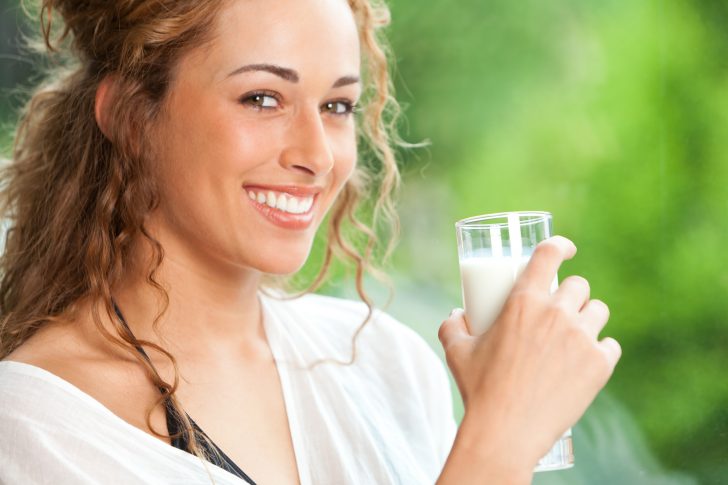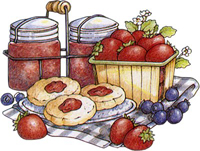The diet of a nursing mother. Daily diet of nursing mom

Only a carefully compiled diet of a nursing mother of a newborn can guarantee the kid to all necessary for its full growth and development.
Diet for nursing mothers of newborns
The nursing mom menu should be maximally balanced by the number of key nutritional components. The quantitative ratio of proteins, fats and carbohydrates should be 1: 1: 4, this is the so-called "gold standard" of nutrition. In the preparation of a daytime diet of a nursing mother, choose from food safe for the child, which will not provoke allergies, colic, etc.
In the first half a year of breastfeeding, the calorie content of the diet of a nursing mothers is slightly more recommended calorie content during pregnancy, i.e. 3000 - 3200 kcal. The lactation process requires certain energy costs.
What to exclude from the diet of a nursing mother?
From the menu of a nursing mom, it is necessary to eliminate those products that can represent a potential danger to the child. It is difficult to call useful: pickles, canned, marinades, dishes with large quantity Spices, spices, smoked and fat. All potential allergens and products are excluded, for example, red fish, spark, honey, brightly painted vegetables and fruits, milk. And also products can cause increased gas formation from a child - cabbage, legumes, grapes, etc.
Approxed diet for a nursing mother
In the nursing mom menu, it is necessary to include basic groups of products: different types Meat, fish, cereals, legumes, vegetables and fruits.
Such a varied menu will allow you to get used to the baby to the food diversity and will prepare a crumb to the introduction of feeding. Sources of full protein and iron is beef, veal, some varieties of birds (turkey, chicken). In the weekly menu, it is necessary to replace meat on the fish a couple of times, which is rich in polyunsaturated omega acids 3. They are involved in the formation of the immunity of the newborn.
The main sources of calcium will be milk and fermented milk products. This trace element is necessary for the full mineralization of the bones and teeth of the child. Moms should remember that calcium is practically not absorbed without the presence of Vitamin D. This vitamin is contained in whole grain cereals, leaf vegetables. Equality products are needed, since rich in a special microflora, useful for the intestinal operation.
Vegetables and fruits can not be ignored - sources of fiber and pectins, which are especially rich in cabbage. But nevertheless introduce it to the diet is recommended only 3 months after childbirth. And initially only in stewed and boiled form, starting with small portions, strictly tracking the reaction of the newborn. Among huge number Types of vegetables, preference is given to the cauliflower. Thanks to her, the diet of a nursing mother will be enriched with a large number of trace elements and vitamins, the process of digestion will work.
Fruits should also be entered gradually, and you need to start with representatives growing in your native climatic zone and having a bright color. For nursing "sweets", you can satisfy your needs for sweets at the expense of fruit, not chocolate and fatty cakes. The ideal option will be bananas, which contain tryptophan (amino acid), helps reduce appetite, normalize sleep. Banach contains magnesium and vitamins B that will support nervous system. In addition, bananas are hypoallergenic.
What does an exemplary diet look like nursing moms of newborns
The nursing mom menu on the day may consist of the following products:
- meat or fish - 200 - 250 g;
- fresh or steamed / boiled / baked vegetables - 0.5-0.6 kg;
- cottage cheese and cheese of solid varieties;
- fruits - no more than 300 g;
- dairy and fermented milk products (can be used in the cooking process or as refueling to salads) 500g;
- cream or vegetable oil - 20 - 35 g;
- sugar is no more than 50 g, this number includes all the sweets, and pure sugar when adding or other drinks.
By constituting the diet, the nursing mother should adhere to the basic rules: do not harm, the most diverse nutrition, with a sufficient amount of all necessary substances.
Nursing mother should take care of their diet. Everyone knows, but not every one knows how to take care of your baby using the installed power mode. In this article we will try to tell you the main points of the correct organization of the diet and help choose the most correct option.
There are several myths that young mothers believe thoughtlessly. It is wrong, and now we will try to debunk the most frequent misconceptions, which are discussed in detail on various forums:
You need to eat for yourself and for a child
This is the most common and harmful myth. Remember: It is important not how much you eat, it is important for the number of useful substances you get from this meal. At the feeding of a child usually goes about 800 kcal per day. Naturally, all products must be the most natural possible: no preservatives, nitrates or artificial dyes. A good assistant in your endeavors will be the principle (specifically the separation of proteins and carbohydrates).

It is incorrect, especially if your child is susceptible. The most frequent allergens, after which you may have to spend a few days in the hospital: chocolate, all red fruits and vegetables, citrus, eggs, seafood, cocoa and peanuts. Abandon all this can be difficult, but it will be better for a child. If you still want to make it all in the diet, do it gradually: first one product that you love most, then the second and so until you return to the usual nutrition.
But it is worth considering if your child is very weak, it is better to refrain from such experiments: even the easiest form of allergies may not affect his health. It will also be correct to refuse alcohol, coffee, soda, chocolate, very fat cream and any sauces that you can buy in the store. Fish can also be a potential allergen, so it's not too fond of cooking. Low-fat varieties are perfectly suitable and last moment "Don't do so immediately after childbirth, wait until the baby is growing a little and only then begin the little to eat your favorite meal.
You can eat only one product, excluding all the rest
So make mothers who are afraid to provoke allergies. This is the root of the wrong approach, because the child will simply stop getting various nutrients from your milk that helps him normally develop. In your diet should be all the necessary products:
- milk products
- craises
- vegetables, fruits and berries
The last two points should be missed with caution so that the child gets used to such a component of your diet gradually. The same can be said about those fruits and vegetables that you have not previously tried so often.

At this point, we will look at the most suitable for the diet of young mothers products so that you understand what exactly your food should be. So here is the detailed list:
- Meat. The first point, which is considered one of the most important. The main thing is not to overdo it - choose low-fat meat, preferably beef, pork or white poultry meat. Boil it, make meatballs or meatballs - in general, choose the most "healthy" recipes.
- Cottage cheese and cheese - good foods for a diet of a nursing mother. Cottage cheese is better to choose the most recent and expose it to any heat treatment. Try cheesecakes, casserole with the addition of additional ingredients, like nuts or berries (of course, in small quantities). Yogurts can also be bought, but here the principle of the other - in them the opposite should be as few taste additives and preservative substances. How to determine? Look at the shelf life - than it is less, the natural product that you hold in your hands.
- Food Fiber Productswhich stimulate the work of the intestine. So you can bypass the side of the problem of many nursing mothers - problems with the digestive tract, which begin immediately after delivery. The list of recommended products includes vegetables (for example, zucchini or cauliflower - not less than 400 grams), fruits (pears, apples, plums, lingonberry, currant - at least 300 grams) and juices (if possible - freshly squeezed, not less than 200 ml). There can also include cereals (buckwheat or oatmeal), dried fruits and coarse bread. Try not to eat the same thing constantly - choose different products to mostly diversify your diet. So you will not get tired of being the same thing, and the beneficial substances will come to your body in the right amount.
It is worth remembering that up to two months your baby is very vulnerable, so during this period, as we said, it is better to have only those products that can not be allergies. Over time, you can return to the usual food rate, but now you need to take care of your child.
After two months (if the indicators are good and pediatricians, then after one and a half) you can enter new products for it. Not more than one per day, it is advisable to start at once - if there will be no negative reaction, you can easily begin a little bit this product several times a week. Allergies are usually revealed in a couple of hours, so if after twelve with the baby everything is in order, you can not worry.
Another popular misconception. The fact is that some children have individual intolerance, so fermented milk products, such as kefira or yogurt (disadvantage, without any additives) will be good assistants in the feeding of the child. If milk really wants, do not drink clean milk: let it be slightly diluted with water or disintegrating tea.

Colics - the case passing, the mother's nutrition does not affect them
This is not quite so. Melon, cucumbers, watermelons - all this can cause colic around your child. In addition, products that have already wandered (like kefir and ryazhenka) can also cause such a reaction in the baby. Bean and sugar should also be temporarily eliminated from the diet: the fermentation process is significantly enhanced by sugar, and the legumes and adults will make me suffer from the stomach, what to talk about the baby? If you love sweetly, look at something similar to Marshmallow or Fastil. Sugar can be replaced with honey or fructose (it should be borne in mind that honey is a fairly common allergen, so it is necessary to enter it very carefully in its diet).
Be sure to eat a lot of meat
This item is truthful enough. Meat is really necessary for the child's vitamin B12. Studies that were conducted in many countries show that mothers who adhered to vegetarian dietThe children were not very healthy: at least, frequent delays mental development were observed. If you do not want to refuse your belief even during pregnancy and feeding, be sure to take appropriate additives.
Calcium additives - mandatory part of the diet
Especially buying such supplements is not necessary. Studies in this area have shown that the difference between mothers who took calcium and between those who did not accept it are very small, so everything is in order - you can not worry about receiving any additional additives, if you do many Rules from those presented in this article.
Waters need to drink a lot
But this myth is fully confirmed. As a rule, young mothers after feeding are very strongly wanting to drink - it is not necessary to limit yourself. The main thing, remember that it should be water or fresh juice, and not a soda or alcoholic beverages. But there is one limitation: the first days after the birth, your chest allocates only colosure - the lactation is established. Because of this, you need to drink a little - liter a day is a limit that should not be overpowering. You may behave, but in most cases unlimited use of any liquid leads to a very strong breast swelling. It is very painful, and it's completely unpleasant to the touch. Believe me to avoid such consequences, to suffer a couple of days.
When everything is established, you can drink about two liters per day - this is normal. Well, if at this time you will drink green tea (Black too can, but in small quantities - It is not as useful as green), fruits, compotes, juices (it is desirable to choose an apple or pear, then dilute them with a small amount of water) and simple water.
Previously, it existed that the black tea, which was added milk or condensed milk, was much improved lactation in the female body. Today, this theory was not confirmed, but if you like such tea, you can drink it.

In conclusion, I would like to say: Be sure to follow how the child reacts to changes in your diet. Each time you try something new, follow its condition - if an allergy begins or you noticed at least the slightest signs, immediately consult a doctor. Believe me, it is better to reinforce it once and how it is better than to run an allergic reaction and not to go on a planned inspection, but to cause an ambulance, a little scary, but it is true - non-compliance with the right diet may be addicted to the child. If you are not ready for such victims, try to translate the baby to the children's mixture (however, it should be discussed with your pediatrician - only he can say how much the child is ready to translate child food).
Food nursing mothers by months
This is enough difficult questionwhich is discussed by many doctors to this day. The modern scheme that is recognized by the majority looks like this (some doctors make small adjustments, but general form Coincides):
- . It is important - you should drink a lot, about the liter more than you drank to feeding. It is considered only pure water. There is one very important moment: too a large number of Water will also reduce the production of milk production, so you should find your golden middle. Usually it is about two and a half - three liters. Fresh vegetables And the fruits will help you to recover after giving birth, the truth is best to use only what you are accustomed to - everything is new or exotic is better to leave for later. You can also have a useful food, like low-fat meat, fish (about the rules of her use, we have already spoken earlier), eggs, pasta, porridge, vegetables (with the exception of potatoes - it's better to limit the necessary minimum here), Marshmallow and Pastilles (no more than once in week). In general, use all hypoallergenic products, but remember - even on them, the baby may be allergic.
- 2-6 months of feeding. Everything gets simpler: you can go to boiled food, abandon the part of vegetables in the diet, slightly expand the frame of the diet. Do not cease to follow the condition of the child - it is still very weak and are subject to allergies.
- Until a year. Boiled food should be the main thing in your diet, but you gradually try to try fried (not fat!) Food. A pair of chocolate fractions in the morning or a small piece exotic fruit Also, they can be a reward for you, but, like last months, track the condition of the baby and leave it one after feeding, if before that you ate something unusual.
- Period up to one and a half years. Congratulations - you can gradually return to the usual diet. Of course, it is not necessary to do it sharply, to th one, you will certainly benefit the partial preservation of the postpartum diet. Proper nutrition always benefits.
Video about how to eat nursing mother
Video about food during feeding
Video about how to eat during breastfeeding
13 364 9
Before we proceed to familiarize yourself with this topic, incredibly important both for your child and for your own health, you need to know the following: on this moment Doctors are not compiled an accurate and categorical diet for a nursing mother. This means that absolutely accurately, no one knows what is the perfect diet. Of course, there are products that can not be used when lactation (alcohol, spices, etc.), their influence on the body of the kid has been studied, and is recognized as harmful, and in some cases and destructive, and there are products recommended for use during this period. However, even the most "innocent" foods in the nutrition of the mother can cause some, especially sensitive children colic, chairs or food disorder. Therefore, introducing new food to your diet to your diet, first of all, it is necessary to monitor the condition and reaction of your baby. It is about what products and in what sequence, it is better to introduce a nursing mother to your diet at various periods of the child, we will tell in this article.
The most important thing is that the nursing mother needs to know - the child gets most Nutrients with Mother's milk, independently synthesize many necessary for the full development and growth of the substance, it is not yet able. That is why its growth, activity, health, directly depend on the qualitative composition of milk. But not only the child needs a heightened amount of nutrients. Milk is produced in the human body, largely, due to its own stocks of proteins, fats, carbohydrates, including trace elements. If this stock is not replenished, the state of a nursing woman can worsen, the body is weakened. In addition, it is necessary to remember that along with a balanced nutrition, the presence of a full rest is extremely important. If you have the opportunity, sleep during the day, use the moments when your baby sleeps to relax. In addition, for your health and your baby's health, it is necessary that the family is quiet and calm.
Also, to establish a stable and constant lactation, it is necessary to observe the power mode. The first breakfast should be one third of the daily diet, lunch is a bit more than a third, and the rest of the portion should be divided between the second breakfast and dinner.
And now, we will analyze in detail the features of the mother's nutrition in different periods of life of the baby.
Nutrition nursing mother in the first days after delivery
 In physiological childbirth, after a few hours an appetite should appear. Often, a strong thirst appears. On this day, it is not recommended to use heavy, difficult to digest food, since, first of all, it is necessary to establish the work of the intestine. Therefore, it is necessary to eat fermented dairy products, low-fat, kefir, sour cream ( little). Cottage cheese and dishes from it ( casseroles, cheesecakes) It is better to use in a small amount so as not to provoke the appearance.
In physiological childbirth, after a few hours an appetite should appear. Often, a strong thirst appears. On this day, it is not recommended to use heavy, difficult to digest food, since, first of all, it is necessary to establish the work of the intestine. Therefore, it is necessary to eat fermented dairy products, low-fat, kefir, sour cream ( little). Cottage cheese and dishes from it ( casseroles, cheesecakes) It is better to use in a small amount so as not to provoke the appearance.
On the second day after childbirth, you can start using meat. Remember that meat needs to be used in boiled or stew, without spice. A low-fat beef, chicken, rabbit meat. Meat need to choose not young and not old - as it is in meat of young and old animals that contains more hormones that can become allergens for your baby and provoke the development of an allergic reaction.
Starting from third day after delivery ( if there are no contraindications, and your doctor did not appoint a diet extension) You can move to your usual diet. Remember that, starting from 3 to 4 days after childbirth, it is noted to increase the production of milk with milk glands, therefore, it is necessary to slightly limit the amount of liquid consumed so as not to provoke the milk stagnation.
In the first 2 - 3 months of lactation, it is advisable to observe the most strict. It is necessary to do this in order for the child to gradually mastered with a new world for him, learned to react to the resulting nutrients and learned to fully absorb them. Later, starting from the 4th month of lactation, you can gradually add new products to your diet. It is necessary to do it slowly and neatly, one product, with interruptions of 4 - 5 days. In the event that the baby will get a tummy or rash, you can understand which product has such a reaction and eliminate this product from your menu.
Products that can be used when drafting
Cereals
- Wheat ( whole wheat, wheat flakes, bran, coarse grinding flour from solid grain). Remember, the abundance of flour products in the diet can lead to the appearance of increased gas formation in the kid. Bran and bread from coarse grinding flour will be very useful if after childbirth a nursing mother there were constipation.
- Oats ( oat groats, oatmeal, oatmeal kissel) - It is desirable to use in small quantities in the first half of the day, since Oats enhances the intestinal peristalsis and can provoke colic in the baby. In addition, a large amount of oatmeal in the diet of the mother can lead to the salinity of the chair in the baby.
- Buckwheat ( buckwheat, buckwheat flour) You can eat in any quantities.
- Rice - with caution, better with carrots, in the form of a non-fat pill, or in the form of a dairy porridge, since its use in pure form can cause constipation.
- Millet.
- Potatoes ( young contains vitamin FROM in old more starch), The amount of potatoes should not exceed 200 grams per day, otherwise, it can provoke an excess weight.
- Beets - only in small quantities, be sure to start using beets after the child turns 3 months, otherwise, allergic reactions may appear in the kid.
- Carrots - use only in the finished form in soups or stew.
- Cabbage. It is desirable, instead of white cabbage, eating color and only in the finished form.
- Pumpkin - you can use in small quantities after 3 months.
- Zucchini - only in stewed form, fried is undesirable.
Dairy products must be eaten daily. The number of fresh milk ( with normal milk tolerance in general) should not exceed 500 ml, kefir - 200 ml. Do not listen to those who will tell you that milk need to drink at least liters per day, or even more. The increase in the amount of milk used in food can lead to the fact that your milk will become more fat, and the child may have a disorder of digestion. Also, remember that milk must necessarily be boiled, even if you eat a homemade cow or goat milk. IN summer period, undesirable to use cheese or fresh cottage cheese, as it is at this time that the risk of infection with various intestines increases.
Fruits
- Apples - in the baked form ( apples should be green) or in the form of compotes.
- Bananas - no more than 1 per day.
- Other fruits and berries ( apricots, peaches, cherry, cherry, etc.) It is necessary to introduce into the diet gradually, after 3 months and necessarily in small quantities.
Basic recommendations:
- Use only fresh meat.
- Meat must necessarily undergo heat treatment.
- Use meat is necessary with vegetables.
- Nuts to eat with caution, not every day in small quantities, as nuts can sharply increase the fat content of milk and cause a child from a child's disorder.
- Eggs can become allergens, therefore, they should be used once every three days, no more than one egg per day.

- Canned food, semi-finished products
- Fruits and vegetables red and orange colors
- Products, with artificial dyes and preservatives ( sausage products, ice cream, yogurts, etc.)
- Sweets
- Smoked
Products, consumed which during lactation is categorically impossible
Above, we talked about the fact that the final and universal diet for a nursing mother was still not compiled. However, there are some foods, the use of which can damage the baby. So, here is a list of products, which are not desirable even in the smallest quantities:
- Alcohol, including low alcohol drinks ( beer)
- Spices, onions, garlic ( change the taste and smell of milk, and the baby can refuse it)
- Beans ( cause an increase in gas formation, which can lead to an intestinal colic)
- Citrus, honey, chocolate, strawberry, nuts ( can cause allergies in a child)
- Meat of crabs, crabs, shrimps ( for the same reason).
- Fresh cucumbers, tomatoes
- Eggplants, mushrooms in any form - these products are very difficult to perceive by a child organism and can lead to a violation of the child's pancreas.
 Summarizing the foregoing, I would like to tell the readers the following. Of course, it is quite difficult to observe a long diet, limit yourself in the use of your favorite products, but you should understand that the state of the baby's health depends on the nutritional mother's nutrition, for the kid to grow well and develops correctly, and it is necessary to go to certain victims. If you are not able to refuse alcohol, continue to smoke, think about the transformation of the child to artificial feeding, as in this situation your breast milk, instead of benefit, huge harm will cause the baby.
Summarizing the foregoing, I would like to tell the readers the following. Of course, it is quite difficult to observe a long diet, limit yourself in the use of your favorite products, but you should understand that the state of the baby's health depends on the nutritional mother's nutrition, for the kid to grow well and develops correctly, and it is necessary to go to certain victims. If you are not able to refuse alcohol, continue to smoke, think about the transformation of the child to artificial feeding, as in this situation your breast milk, instead of benefit, huge harm will cause the baby. Another very much important questionwhich often concerns nursing mothers - the appearance of overweight. In order to avoid this not to run on food containing a large amount of carbohydrates. However, even with a proposed diet, it may happen that your weight will not immediately return to the norm. Lose weight with various diets, drugs and active sports during lactation can not! This can lead not only to stopping lactation, but also to enhanced "washout" from your body necessary vitamins and trace elements. This may lead not only to the violations in the growth and development of the baby, but also the emergence of various pathological conditions in a nursing mother (for example, an increased risk of fractures with calcium deficiency). Do not risk and your health and health kid.